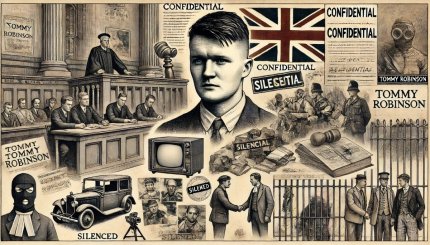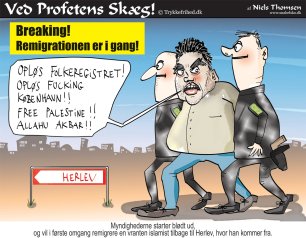In his 2021 injunction against Tommy Robinsons documentary; "Silenced", English judge Nicklin chose not only to ignore five testimonies from former students. Nicklin discarded evidence and testimony from school staff obtained on hidden camera, but, perhaps more importantly, he also chose to ignore meeting minutes and school documents that corroborated Robinson's interpretation of the Kirklees school conflict. The whole case, judgement and subsequent imprisonment of Tommy Robinson therefore appears deeply political.
Last week’s court decision in England was unusual in many ways: An English judge sentenced Tommy Robinson to 18 months of unconditional imprisonment for violating a civil injunction against publishing a documentary film, which has so far been seen by over 58 million people on social media and must thus be concluded to have public interest.
The court decision was immedeatly interpreted in English media as if it had nothing to do with freedom of speech and politics, as were it only a matter of a thugs confession to a violation of a well-founded judicial ban on patently false allegations made against a Syrian refugee boy at an English school around 2018-19. But was that true? Was that the whole truth about the case? The central question regarding Robinson's documentary; "Silenced", was never asked by one English journalist: Why did an English judge initially ban the publication of the documentary in 2021? Was Judge Nicklin's ban on the documentary factual, balanced and well-reasoned - or was it tendentious and politically motivated?
Nicklin reasonably blames himself in several places for the fact that several incriminating testimonies from students against Jamal Hijazi are not always supported by minutes or documents from the school. Where meeting minutes and documents from the school conversely confirm incriminating testimony about Hijazi, Nicklin quite conspicuously chooses to ignore these source statements from the school. In the film documentary, Robinson has access to a selection of school documents that confirm his view of the case, but none of these documents appear to be included in Judge Nicklin's ruling.
Some conclusions and assessments in Judge Nicklin's ban on the documentary from 2021 thus appear tendentious and raise suspicions of a political court decision, calculated to shut down an inconvenient debate, which in practice involves an intervention in Robinson's freedom of expression.
Already in the introduction to the court decision, it appears that Judge Nicklin is influenced by the media's interpretation of the Jamal case in 2018: He refers, among other things, to this headline in the Daily Mail 27.11. 2018, where Jamal Hijazi is portrayed as an innocent victim of primitive and racist school bullies and Nicklin concludes: "Although there was no direct evidence that the incident had been racially motivated, it was quickly perceived as an example of racist bullying". Nicklin acknowledges that there was no evidence of racist bullying, but still leans towards this quick and badly researched exposition of the case by English media from 2018. Nicklin's presentation of Robinson also follows English mainstream media: A "controversial figure", leader of the EDL and former member of the British Nationalist Party. A bad boy, in other words.
In the 2021 trial of Tommy Robinson, five different current and former students from the school gave testimony supporting Robinson's presentation of the case. No witnesses from the school testified in favor of Hijazi, except for his father.
Typical of Judge Nicklin's assessments and court decision is that he chooses to trust Hijazi and his father and that he rejects the testimony of the 5 students as unreliable. Why the 5 students would consistently lie about episodes involving the Syrian student, Nicklin does not provide any credible explanation for, but bases his assessment on a rejection of their testimony, where there are no school documents to support them. And even where school documents actually support Robinson's assessment of Jamal Hijazi as a student who caused trouble and made threats of violence against other students, Nicklin makes a tendentious decision to ignore or disqualify this evidence.
Thus, for example, under point 85 of Nicklin's court decision about a report of a school meeting on 09/11/2018 with Hijazi's father, where the school report actually states about the Syrian schoolboy that "... a knife and a screwdriver were found in his bag" . Here, Nicklin chooses to believe Hijazi's statement that the knife allegedly did not belong to him, and Nicklin also chooses to interpret the school report as an incorrect and erroneous representation of what Hijazi's father should have said: "The report appears to have inaccurately recorded Mr. Hijazi's expressed concern…”.
So when students mention incidents of violence with Jamal, Nicklin dismisses these stories as fabrications and lies because, he alleges there are no school records to corroborate them. But when school records corroborate them, Nicklin chooses to ignore or disqualify these records.
Another example: An email from a teacher (point 66) tells of a fight at school between Jamal Hijazi and a younger student, where a third student intervened and defended a student who had been attacked by Jamal (“The claimant (Jamal ) began to beat and was over him”). Nicklin here simply concludes that Jamal was not "a bully".
Pkt: 53: A student (MVY) states that Jamal stabbed him with a compass-like object at school so that he bled ("he ... made me bleed"). Nicklin rejects the testimony on the grounds that Robinson must have influenced the testimony.
Point 69: A schoolgirl states that Jamal assaulted her and spat on her on the way home from school. Judge Nicklin rejects the testimony on the grounds that there are no school records to confirm the incident. According to the girl, it doesn't because it took place outside the school. But Nicklin, who also refers to school shootings about Jamal, rejects this as a "good and polite" boy.
A point of contention in the trial between Jamal Hijazi and Tommy Robinson concerns the testimony of a schoolgirl; Charly Matthews, who claimed Jamal hit her with a hockey stick in PE class. The girl gives this testimony in the documentary; "Silenced" and also testified in court and a boy in the class confirmed her testimony about the episode. Judge Nicklin again chooses to trust Jamal Hizaji, who of course denies the incident, and he adheres to conflicting details in the testimony of Charly Matthews and the other male student, as well as noting that there are no school reports or documents that confirm that the hockey stick attack was have taken place. Charly Matthews claims in her testimony that several years later she was still suffering from back pain from the assault and again Nicklin reasonably notes that there is no medical report to confirm this statement.
There is, however, a school report of 04/04/2019 about a meeting between a representative from the school and Charly Matthew's mother, where the mother apparently expresses fear that the news about Jamal's assault on her daughter will get out: "She (the mother) asked that everyone not get knowing that and stated, 'it will be between us: (Jamal Hijazi) hit Charly with a hockey stick and that's the reason she doesn't come to school anymore'. Nicklin concludes from this that both the girl, who claims to have been assaulted by Jamal, and the girl's mother are untrustworthy, because they did not then proceed to report the episode of violence to either the police or the school management. Judge Nicklin then considers what the reason could be for Charly Matthes to make up the story about Jamal's hockey stick attack on her - and ends up concluding that the girl is lying for no good reason. She's just lying. Thus Judge Nicklin (paragraph 116); “…why Charly Matthews and the OTP would be willing to come to a High Court case and lie. I can't readily identify any explanation … Charly stated as an argument that she is a first year law student. Objectively, therefore, she has a lot to lose by giving false testimony in court cases... People can lie for reasons that don't make sense; sometimes for no reason at all. I am convinced that the burden of knowledge of both Charly Matthews and the OTP about the hockey stick episode is false" - concludes Judge Nicklin, who thus disregards two student testimonies and a meeting report from the school with the female student's mother, which mentions the hockey stick the episode.
Judge Nicklin refuses to include Tommy Robinson's documentary; "Silenced" as a credible source for the case, because the revealing testimonies from the school staff were recorded on a hidden camera. The school principal begins the film by stating that the case is a tragedy for all parties, that the original fight between Bailey and Jamal was not racially motivated, as it was otherwise interpreted by all the media at the time. A female employee at the school confirms Robinson's statement that Bailey was not racist, two female employees at the school confirm the statement that Jamal should have acted threateningly and aggressively towards girls and women. And the most revealing: A former employee of the school not only confirms the incriminating statements against Jamal ("Jamal said he wanted to stab him with a knife"), but admits on hidden camera that Kirklees City Council has paid the school's employees large sums of money to sign non-disclosure agreements (“Tommy, I took the money … £18,000”) obliging them never to speak publicly about the matter.
It appears from city council documents, which Robinson presents in the documentary, that Kirklees City Council has paid a total of 274,735 British pounds (approx. DKK 2,350,000) for the silence of witnesses and school staff in the Jamal case. Robinson gained access to these city council documents by way of a freedom of information act, but Judge Nicklin completely disregards this evidence in the case.
It also appears from "Silenced" that Kirklees city council, and especially the leading city council member Shamin Pandor, worked closely with his brother, Imam Mohammed Amin Pandor, to whip up a Muslim crowd in front of the school in order to exploit the matter politically. The same imam later took an active part in a campaign against a caseless teacher at another English school; Batley Grammar School, where a teacher had shown pupils a picture of the Muslim prophet and received death threats from the muslim community in England
Conclusion: Judge Nicklin's injunction against publication of Tommy Robinson's documentary; "Silenced" in 2021 is based on a tendentious interpretation of the source material and a willingness to disregard sources that do not seem to confirm his preconceived opinion on the matter.
Where school documents appear to corroborate Robinson's view of the matter, Nicklin disregards and disqualifies these documents.
Where 5 school students testify in favor of Robinson's interpretation of the case, Nicklin concludes that they are all lying - without being able to explain why.
The fact that no witnesses defended Hijazi's view of the case does not matter to Judge Nicklin, who unilaterally chooses to believe him
Testimony from school staff corroborating Robinson's view of the case is dismissed on the grounds that statements made on hidden camera cannot be used in court
Nicklin ignores evidence in "Silenced" documenting how school staff were pressured and paid to sign non-disclosure agreements about the case. And Nicklin is not interested in what the reason for this might be
Nicklin ignores the political connections in the case between senior councilor Shamir Pandor and his imam brother Mohammed Pandor, who actively whipped up a mood around the case in Kirklees.
If you compare the above with the fact that Robinson has now received a disproportionately harsh sentence of 18 months in prison - a sentence without precedent in the English legal system for a similar offense - and you combine this knowledge with the English prison service's latest treatment of Robinson, where he is now be transferred to prison, where his life and security will be in danger, one must conclude that the treatment of Tommy Robinson by the English judiciary and English political authorities is unjust and deeply politically motivated.



